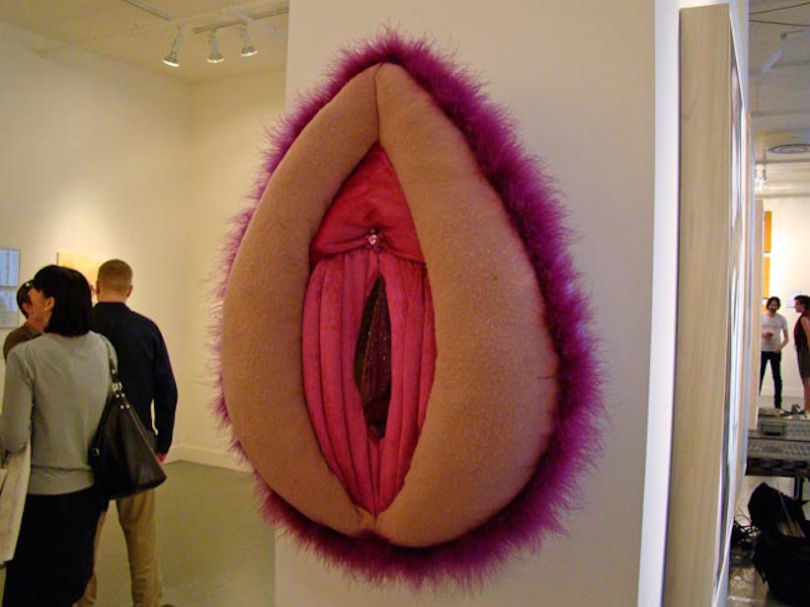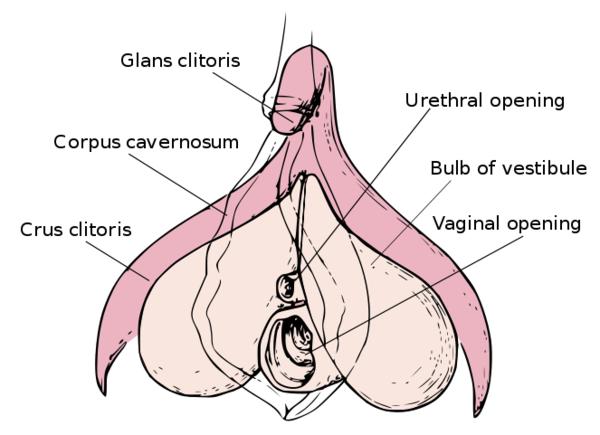 When I was taking my Intro to Psychology class in college, I had this really great professor. She was all about discovery-based interactive learning, doing projects and activities to figure things out instead of listening to someone lecture and taking notes. One day, we did an exercise about slang words. She divided us into small groups and told us that she was going to put some words up on the screen, one at a time. In our groups, we were to come up with as many synonyms as we could think of for each of the words. The words were things like “penis,” “testicles,” “vagina,” “breasts,” “menstruation.” The word “vulva” did not appear on the screen.
When I was taking my Intro to Psychology class in college, I had this really great professor. She was all about discovery-based interactive learning, doing projects and activities to figure things out instead of listening to someone lecture and taking notes. One day, we did an exercise about slang words. She divided us into small groups and told us that she was going to put some words up on the screen, one at a time. In our groups, we were to come up with as many synonyms as we could think of for each of the words. The words were things like “penis,” “testicles,” “vagina,” “breasts,” “menstruation.” The word “vulva” did not appear on the screen.
After we finished the exercise, the professor had us look at which words had the most synonyms as a class. “Testicles” won, intriguingly enough, and there were also a lot of slang terms for “breasts”. The professor asked us what we thought this might mean. Why do we need twelve or more different words or phrases to talk about testicles but only three or so for vaginas? Our professor talked about how as a general rule, when a culture values something highly, it comes up with lots of synonyms for that thing. If we’re going to talk about something a lot, we’re going to need words for formal, informal, rude, polite, familiar, and academic conversations. We want different words with varying connotations and nuances. Connotations can be crucial: “beautiful” and “attractive” might be listed as synonyms in the thesaurus, but if you’re talking about how aesthetically pleasing your dog is, only one of those words is going to be socially appropriate. Speaking of “beautiful,” we have a lot of synonyms for it because as a culture, we care a lot about aesthetics and we like beautiful things. My professor finished the exercise by saying “So one could say that we have a culture of tits and balls.”
Words are important because they are an indicator of what we value, and conversely, the words we have also shape our perception of the world around us. One other thing my professor pointed out is that bio-sex male humans also have breasts, and that our slang words made no acknowledgement of that fact. We don’t value the breasts of non-female humans very much, and our language reflects that. Perhaps more interestingly, the words we use can change the way we think. Not having words for the breasts of male persons means that we don’t think about them when we talk about breasts. If we have certain categories, we will place the things we come across into those categories. As our type, number, and definition of categories change, so does the way we view our world.
Here’s how I see our cultural reluctance to use the word “vulva.” Our culture doesn’t value the non-vagina parts of female genitals very highly, so we don’t talk about them much, especially outside of scientific contexts. Since we don’t talk about vulvas very often, we don’t come up with vulva-specific slang terms. Individuals don’t want to use scientific, academic language in situations where slang might be more comfortable (like, say, dirty talk or erotica), so they instead use slang words that are less accurate but more situationally appropriate. In doing so, they reinforce the idea that we shouldn’t use the word vulva, and that vulvas aren’t of value to the erotic conversation.
We can break the cycle. We can talk about vulvas. We can come up with cool slang words that specifically refer to vulvas. We can bring vulvas into our erotic discussions and insist that vulvas belong there. Words can shape our perceptions and our values, but our perceptions and values can also shape our words. If we value vulvas, we should talk about vulvas. If we talk about vulvas, we can shift our culture towards valuing vulvas, and by association, recognizing the inherent value of people with vulvas. That sounds like a world I want to live in.
Annamarie Myers is a sex blogger with lots of opinions about genitals, culture, words, sex toys, and tea. You can find her at annamarieinthemiddle.wordpress.com and on Twitter @myers_annamarie.

 of the vulva.
of the vulva.